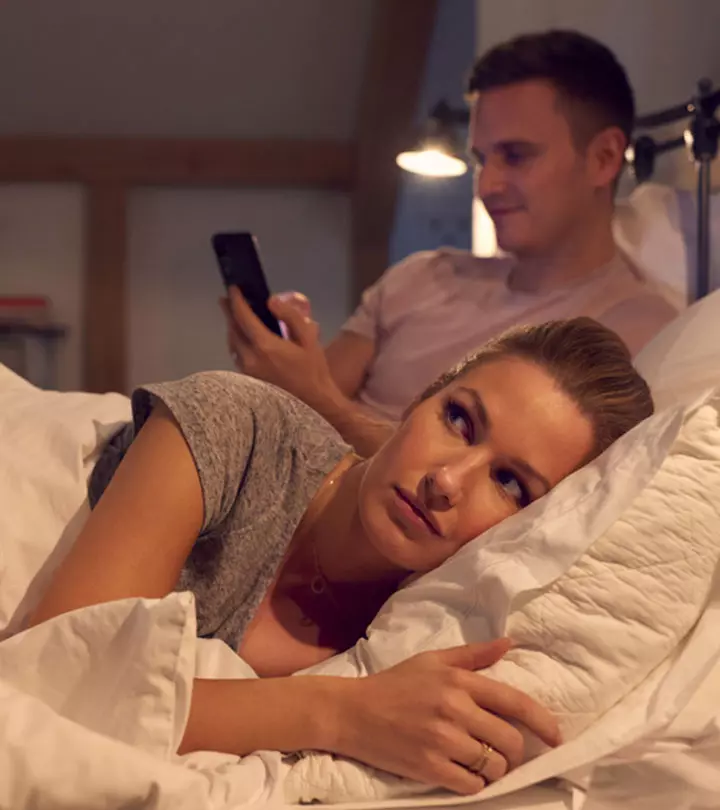7 Things You’re Better Off Not Doing In Bed

Image: Shutterstock
Our beds have now become makeshift working desks or a place where we carry out our daily routines. While it may feel relaxing to engage in activities from the comfort of our beds, certain habits can significantly impact how we start our day. Avoiding these habits can lead to a transformative change in our lives, setting the tone for a more productive and positive day ahead. Read on to know them all!
In This Article
1. Keeping A Glass Of Water Near The Bed
Placing a glass of water on your bedside table can serve as a helpful reminder to hydrate before bedtime. However, if you find it difficult to fall asleep, drinking water from that glass may lead to more frequent trips to the bathroom, disrupting your sleep. To ensure a restful night, consider an alternative like drinking a glass of milk before bedtime. Milk contains compounds that stimulate the production of the “happy hormone,” leaving your mind clearer and promoting a peaceful night’s rest (1).
2. Looking At Your Phone
It’s recommended to avoid using light-emitting devices at least one hour before bedtime. Engaging with your phone or other gadgets in bed can stimulate your mind, signaling your body to stay awake. The blue light emitted by these electronic devices with backlit displays can also interfere with the release of melatonin, a vital sleep hormone that helps regulate our sleep/wake cycle. Instead of scrolling through your phone until you fall asleep, opt for a more calming bedtime routine. Consider reading a book until you feel drowsy, as this can help you unwind and prepare your mind for a restful night’s sleep.
3. Watching The Clock
Resist the urge to constantly glance at the clock when you settle into bed, anxiously wondering when sleep will finally arrive. Having a clock nearby can lead to a cycle of checking the time repeatedly, especially when sleep seems elusive. This only amplifies the anxiety surrounding sleep, making it even more challenging to drift off peacefully. To promote better sleep habits, consider setting an alarm and placing your phone out of reach during the night.
4. Watching Movies Or TV
Although watching TV in bed may feel soothing, it can inadvertently train your brain to associate the bed with entertainment rather than a place for sleep. Moreover, falling asleep with the TV on can lead to sudden level shifts and sound variations that can wake you up. To promote better sleep quality, it’s best to keep the TV out of the bedroom if possible. Alternatively, if you must watch TV, consider doing so from a chair or another designated area, so your bed remains solely associated with sleeping.
5. Playing Video Games
Engaging in highly engrossing activities like video games can significantly hinder your ability to fall asleep and disrupt your sleep schedule. The stimulation from these gadgets can activate and excite parts of your body, making it challenging to drift off peacefully. To improve your sleep quality, it’s advisable to keep electronic gadgets away from your bedroom for at least one hour before bedtime. This allows your mind to unwind and prepares your body for a more restful night’s sleep. By limiting screen time before bed, you can create a calming environment that encourages better sleep and overall well-being.
6. Forcing Yourself To Fall Asleep
Falling asleep is a natural process that cannot be forced or controlled within a set timeframe or under any conditions. Attempting to pressure yourself into sleep or stressing over it will only exacerbate the issue, as your body will rest when it is ready. Instead, create a conducive sleep environment and allow events to unfold naturally. Avoid dwelling on the idea of sleep and let go of any anxious thoughts about it. Trust that your body will find its rhythm and drift off to sleep when the time is right.
7. Listening To Music
Although listening to music before bed might seem soothing, it may not be the best practice for optimal sleep. Music can lead to dopamine spikes in the brain, improving mood but also increasing body temperature and heart rate, making it harder to fall asleep (2). Instead, if you prefer some background noise, consider activating a fan or using a white noise machine. These options provide a calming and consistent sound that can help create a more conducive sleep environment. By choosing the right background noise, you can enhance your sleep quality and drift off more easily.
Your bedtime routine plays a crucial role in the quality of your sleep and overall well-being. Avoiding certain activities in bed can have a significant impact on your sleep quality and health. Additionally, be mindful of your caffeine and alcohol intake close to bedtime, as they can interfere with your sleep patterns. Instead, create a tranquil sleep environment by keeping your bed reserved for sleep and intimacy. Embrace relaxation techniques like reading or gentle stretching to unwind before bedtime. By incorporating these healthy habits and avoiding counterproductive activities, you can set the stage for restful nights and wake up feeling refreshed and revitalized each day. Have a good night’s sleep!


























